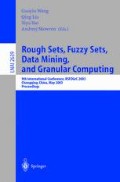Abstract
This paper presents a study of knowledge based descriptive neural networks (DNN). DNN is a neural network that incorporates rules extracted from trained neural networks. One of the major drawbacks of neural network models is that they could not explain what they have done. Extracting rules from trained neural networks is one of the solutions. However, how to effectively use extracted rules has been paid little attention. This paper addresses issues of effective ways of using these extracted rules. With the introduction of DNN, we not only keep the good feature of nonlinearity in neural networks but also have explanation of underlying reasoning mechanisms, for instance, how prediction is made.
Access this chapter
Tax calculation will be finalised at checkout
Purchases are for personal use only
Preview
Unable to display preview. Download preview PDF.
References
R. Andrews, J. Diederich, & A. Tickle, “Survey and critique of techniques for extracting rules from trained artificial neural networks”, Knowledge Based Systems, 8(6), 373–389, 1995.
J. S. Armstrong, Principles of Forecasting: A Handbook for Researchers and Practitioners, Norwell, MA: Kluwer Academic Publishers, 2001.
G. A. Carpenter & A. W. Tan, “Rule Extraction: From Neural Architecture to Symbolic Representation”, Connection Science, 7(1), pp3–27, 1995.
W. Duch, R. Adamczak & K. Grabczewski, “A new methodology of extraction, optimization and application of crisp and fuzzy logical rules”, IEEE Trans Neural Networks, 11(2), 1–31, 2000.
L. M. Fu, “Rule Generation from Neural Networks”, IEEE transactions on systems, man and cybernetics, 28(8), 1114–1124, 1994.
S. Horikawa, et. al, “On Fuzzy Modeling Using Fuzzy Neural Networks with the Back-propagation Algorithm”, IEEE Trans Neural Networks, 3, 801–806, 1992.
N. Kasabov, “On-line learning, reasoning, rule extraction and aggregation in locally optimised evolving fuzzy neural networks”, Neurocomputing, 41(1–4), 25–45, 2001.
S. Mitra, S. K. Pal and P. Mitra, “Data mining in soft computing framework: A survey”, IEEE Trans Neural Networks, 13, 3–14, 2002.
F Maire, “A Partial Order for the M-of-N Rule Extraction Algorithm”, IEEE Trans Neural Networks, 8(6), 1542–1544, 1997.
D. Opitz & J. Shavlik, “Actively searching for an effective neural-network ensemble”, Connection Science, 8, 1996, 337–353.
A. N. Refenes, A. Zapranis, and G. Francis, “Stock Performance Modeling Using Neural Networks: A Comparative Study with Regression Models”, Neural Network, 5, 961–970 1994.
R. Setiono, “Extracting M-of-N Rules From Trained Neural Networks”, IEEE Trans Neural Networks, 11(2), 512–519, 2000.
S. Thrun, “Extracting rules from artificial neural networks with distributed representations.” In Tesauro, G.; Touretzky, D.; and Leen, T., eds., Advances in Neural Information Processing Systems (NIPS) 7. Cambridge, MA: MIT Press, pp. 505–512, 1995.
A. Tickle, R. Andrews, M. Golea & J. Diederich, “The Truth Will Come To Light: Directions and Challenges in Extracting the Knowledge Embedded Within Trained Artificial Neural Networks”, IEEE Trans Neural Networks 9(6), 1057–1068, 1998.
H. White, “Learning in Artificial Neural Networks: A Statistical Perspective”, Neural Computation, 1, 425–465, 1989.
J. T. Yao, C. L. Tan, “A Case Study on Using Neural Networks to Perform Technical Forecasting of Forex”, Neurocomputing, 34(1–4), 79–98, 2000.
J. T. Yao, “Towards a Better Forecasting Model for Economic Indices”, The 6th International Conference on Computer Science and Informatics, USA. pp. 299–303, 2002
Y.Y. Yao “On Modeling data mining with granular computing”, Proceedings of COMPSAC 2001, pp. 638–643, 2001.
L. A. Zadeh, “The roles of fuzzy logic and soft computing in the conception, design and deployment of intelligent systems”, H. S. Nwana and N. Azarmi (Eds), Software Agents and Soft Computing: Towards Enhancing Machine Intelligence, Concepts and Applications, Springer Verlag, 1997, pp183–190.
Author information
Authors and Affiliations
Editor information
Editors and Affiliations
Rights and permissions
Copyright information
© 2003 Springer-Verlag Berlin Heidelberg
About this paper
Cite this paper
Yao, J.T. (2003). Knowledge Based Descriptive Neural Networks. In: Wang, G., Liu, Q., Yao, Y., Skowron, A. (eds) Rough Sets, Fuzzy Sets, Data Mining, and Granular Computing. RSFDGrC 2003. Lecture Notes in Computer Science(), vol 2639. Springer, Berlin, Heidelberg. https://doi.org/10.1007/3-540-39205-X_72
Download citation
DOI: https://doi.org/10.1007/3-540-39205-X_72
Published:
Publisher Name: Springer, Berlin, Heidelberg
Print ISBN: 978-3-540-14040-5
Online ISBN: 978-3-540-39205-7
eBook Packages: Springer Book Archive

